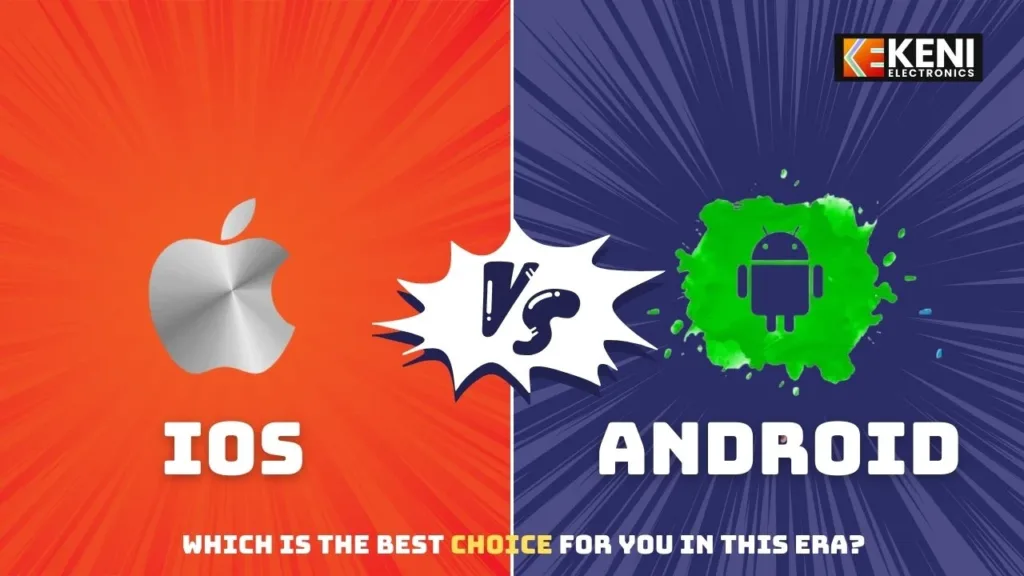iOS vs Android: Which Is the Best Choice for You in this Era?

Table of Contents
Introduction
When it comes to choosing a smartphone, one of the biggest debates is whether to go for an iPhone with iOS or a phone with Android. Both operating systems have their loyal fans, and each comes with its own strengths and weaknesses. If you’re wondering which is the best for your lifestyle, this article will guide you through all the important factors to consider before making your decision.
iOS vs Android: What’s the Difference?
Before diving into the details, let’s take a quick look at what sets iOS and Android apart:
- iOS is Apple’s proprietary operating system, found exclusively on iPhones, iPads, and other Apple devices.
- Android is an open-source operating system developed by Google, used by many manufacturers, including Samsung, Google Pixel, OnePlus, and others.
Now, let’s explore which one might be right for you based on your needs, preferences, and budget.
1. User Interface & Experience
- iOS: iPhones have a smooth, consistent, and intuitive user interface (UI). Apple’s design philosophy focuses on simplicity and ease of use. There’s less clutter and customization, which is a plus for people who like things straightforward.
- Android: Android offers a high level of customization. You can tweak the home screen, change the icons, and even install widgets in a way that fits your style. If you enjoy personalizing your phone, Android is a great choice.
Verdict: iOS is better for users who prefer simplicity, while Android is ideal for those who like customizing their experience.
2. App Store and App Quality
- iOS: The Apple App Store is known for its strict guidelines. This often means that apps are more polished, reliable, and secure. Developers usually launch apps on iOS first, so you get access to the latest features earlier.
- Android: The Google Play Store offers a broader variety of apps, but it’s less regulated. As a result, the quality can vary greatly. However, Android users can also sideload apps from third-party stores or websites.
Verdict: If app quality and security are crucial to you, iOS is the way to go. But if you want more freedom to explore different apps, Android has more variety.
3. Customization & Personalization
- iOS: iOS is pretty locked down when it comes to customization. While you can change wallpapers, rearrange apps, and set widgets, the experience remains largely uniform across iPhones.
- Android: Android’s flexibility allows for extensive customization. You can install third-party launchers, use custom widgets, and even adjust how the operating system behaves. If you want to make your phone uniquely yours, Android shines here.
Verdict: Android is perfect for customization lovers, while iOS is more suited for those who appreciate a uniform, sleek design.
4. Performance & Speed
- iOS: iPhones are optimized to work seamlessly with Apple’s hardware. Apple designs both the software and hardware, meaning iPhones are often faster and more efficient than many Android devices. Updates are rolled out simultaneously to all supported devices, ensuring everyone has the latest version.
- Android: Performance on Android varies based on the device. Flagship phones like the Google Pixel and Samsung Galaxy models perform excellently, but budget phones may lag behind. Android’s fragmentation means that updates are not always consistent across devices, which could lead to security vulnerabilities on older models.
Verdict: iOS generally offers a more consistent and smoother experience, while Android’s performance can vary depending on the phone model.
5. Battery Life & Charging
- iOS: iPhones have optimized battery performance, and while battery life has improved over the years, heavy usage can still require a recharge during the day. Apple’s power-efficient chips and iOS optimization help keep battery drain at bay.
- Android: Android devices vary greatly when it comes to battery life. Premium models like the Samsung Galaxy S series last all day, while some budget phones may not last as long. Android also supports a wider range of fast-charging options.
Verdict: iPhones are good for day-to-day use, but Android’s diverse models give you more options if you’re looking for specific battery life or fast-charging features.
6. Security & Privacy
- iOS: Apple is known for its focus on security and privacy. iOS devices get frequent updates, and Apple’s strict control over its app ecosystem means malicious apps are less likely to sneak through. The company also offers great features like Face ID and encrypted messaging.
- Android: While Android is generally secure, its openness means there’s a slightly higher risk of malware or data breaches, especially if you install apps from unknown sources. However, Google has made strides to enhance security in recent years with features like Google Play Protect and regular security updates.
Verdict: iOS wins when it comes to security and privacy, offering better protection overall.
7. Pricing & Device Options
- iOS: iPhones tend to be more expensive, with few budget options. If you want a premium, long-lasting device with top-tier features, iPhones are a great choice. However, if you’re on a budget, an iPhone might not be the best fit.
- Android: Android offers a wide range of devices, from budget-friendly options to premium flagships. You can find an Android phone that fits almost any budget.
Verdict: If you’re budget-conscious, Android offers far more affordable options. For high-end devices, both iOS and Android have strong contenders.
8. Software Updates
- iOS: iPhones typically receive software updates for several years. Apple offers support for older devices for a longer period, ensuring they stay up-to-date with the latest features and security patches.
- Android: Software updates on Android can be hit or miss. While flagship phones from brands like Google and Samsung receive regular updates, many budget devices may only get one or two major updates during their lifespan.
Verdict: iOS is the winner when it comes to longevity and software updates. If you plan to keep your phone for several years, iOS is more reliable.
9. Ecosystem Integration
- iOS: Apple has a highly integrated ecosystem, meaning your iPhone works seamlessly with other Apple devices such as the Apple Watch, MacBook, and iPad. This integration can make your life much more convenient if you already own multiple Apple products.
- Android: Android’s ecosystem is more fragmented since it works with many different manufacturers. However, Google’s services (such as Gmail, Google Drive, and Google Photos) work well across devices, and Android integrates well with smart home products like Google Nest.
Verdict: If you’re already in the Apple ecosystem, iOS is the way to go. For those who use a mix of devices and prefer Google services, Android is a better fit.
10. Which Is Better for You?
- Choose iOS if you prefer:
- A consistent, user-friendly experience
- Strong security and privacy features
- A reliable ecosystem of devices
- Regular software updates for years
- Choose Android if you prefer:
- Customization and flexibility
- A wider range of devices at different price points
- Greater control over your apps and device behavior
- Integration with Google services and the flexibility to switch manufacturers
Conclusion: The Final Verdict
There is no one-size-fits-all answer when it comes to choosing between iOS and Android. Your decision depends on your priorities—whether it’s app quality, customization, price, or security. Both operating systems have come a long way, and you can’t go wrong with either. The key is to match the OS to your specific needs and lifestyle.








Add comment